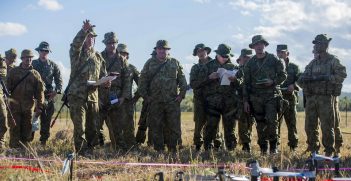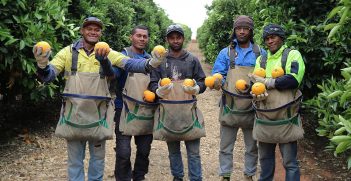18 June: The Week in Australian Foreign Affairs

This week in Australian foreign affairs: Morrison at the G7 Plus, steps towards an Australia-UK Free Trade Agreement, Payne and Dutton meet with their German counterparts, Hawke on the ‘Biloela family’, and more.
Prime Minister Scott Morrison travelled to Cornwall, United Kingdom to attend the G7 Leaders’ Summit from 11 to 13 June at the invitation of British Prime Minister Boris Johnson. In a media release on 10 June, Morrison stated that ‘there has never been a more important time for Australia to be at the table with the world’s largest liberal democracies and advanced economies.’ He further noted that the G7 Summit is his first travel outside the Indo-Pacific region since the beginning of the COVID-19 pandemic.
On 12 June, whilst at the G7 Summit, Morrison and Johnson met and ‘discussed a number of issues of mutual concern, including the Indo-Pacific region.’ The Prime Ministers ‘agreed that the strategic context in the Indo-Pacific [is] changing’.
Morrison announced on 15 June that he and Johnson had agreed ‘on the broad outlines of an Australia-UK Free Trade Agreement.’ The Agreement will result in ‘greater access to a range of high-quality products made in both countries as well as greater access for businesses and workers’. All tariffs on British imports will be ‘eliminated within five years’ and ’99 per cent of Australian goods … [will enter] the UK duty free when the agreement enters into force.’
On 17 June, Minister for Trade Dan Tehan reflected on the finalisation of the Australia-UK Agreement in Principle. Tehan noted that ‘free trade agreements are complex, legal documents and there is still much work to do to deliver our final agreement with the UK. When the agreement is finalised it will deliver the most comprehensive and liberal agreement outside our partnership with New Zealand.’
On 11 June, Morrison issued a statement announcing that Australia will commit at least 20 million vaccine doses as part of a ‘global G7 push to boost access to safe and effective COVID-19 vaccines and pandemic preparedness in developing countries.’ Morrison noted that ‘COVID does not respect borders and the pandemic is not a problem confined to any one nation. That’s why we will commit to distributing at least an additional 20 million vaccine doses across our region.’
Morrison delivered a speech at the Australia-United Kingdom Chamber of Commerce in London on 14 June. He noted that ‘we have to tend that garden of the liberal democracies of the world and we have to stand up for them in a way that ensures we demonstrate that they work and that they do bring peace and they do bring prosperity, and they do improve the wellbeing of the people all around the world.’ He also referred to reinforcing the Australia-UK trade relationship as ‘a great opportunity for this moment.’
On 15 June, Morrison spoke after meeting with French President Emmanuel Macron in Paris. Morrison stated that ‘every element of [the French-Australia] partnership is about reinforcing the values and beliefs that we hold dearly … we are good friends, we are good partners, we share common goals and we share common values [including] liberty and affinity.’
Morrison addressed the Organisation for Economic Cooperation and Development (OECD) Council in Paris, France on 16 June. He stated that, ‘At this moment in history, international institutions like the OECD [which are] founded on liberal democratic market-based economic models and values … are more important than ever.’ Morrison further noted that ‘A carbon neutral economy, a net zero economy … is the future. That is the reality.’
On 13 June, Morrison released a joint statement with Chancellor of Germany, Angela Merkel, where the leaders noted that they had ‘discussed their mutual commitment to ambitious action on climate change in line with the Paris Agreement, and to deeper collaboration and partnership towards achieving net zero emissions and keeping the 1.5 °C temperature goal within reach.’
Morrison issued a media release on 13 June where he announced the Declaration of Intent between the Government of Australia and the Government of Germany on the Australia-Germany Hydrogen Accord, which will create ‘new economic opportunities and jobs while reducing emissions.’ He noted that ‘international collaboration focused on technological innovation [is] key to getting new technologies like hydrogen to commercial parity.’ The Accord includes three major initiatives: establishing the German-Australian Hydrogen Innovation and Technology Incubator, facilitating industry-to-industry cooperation on demonstration projects in Australian hydrogen hubs, and exploring options to facilitate the trade of hydrogen and its derivatives from Australia to Germany.
On 10 June, Morrison announced that Australia and Singapore will ‘establish a $30 million partnership to accelerate the deployment of low emissions fuels and technologies like clean hydrogen to reduce emissions in maritime and port operations.’ Morrison noted that ‘[Australia is] working with partners around the world to make clean energy more affordable and reliable. We are positioning Australia to succeed by investing now in the new technologies that will support jobs and industries into the future.’
Morrison issued a joint statement with Singaporean Prime Minister Lee Hsien Loong on 10 June on the sixth Australia-Singapore Annual Leaders’ Meeting. The Prime Ministers recognised that a ‘strong, cohesive, and responsive ASEAN is vital to the region’s success and recovery’ and ‘reaffirmed their shared commitment to maintain and promote peace, security and stability in the region’.
On 13 June, Morrison released a statement on the Japan-Australia relationship, specifically the countries’ ‘determination to further [collaborate] on efforts to achieve decarbonisation and a net zero emissions future.’
Morrison issued a statement on 14 June announcing that Australia has joined the High Ambition Coalition for Nature and People, an international alliance of 60 countries ‘committed to forging a global deal to conserve 30 per cent of the world’s land and sea’.
On 15 June, Morrison addressed the Australian Petroleum Production and Exploration Association Conference. He stated that, ‘the oil and gas sector is a major contributor to Australia’s prosperity – always has, always will be’ and that ‘in Australia, we will lead the world in these heavy industry and oil and gas sectors to ensure that we can reduce emissions, be a successful part of the new energy economy and secure Australia’s prosperity all at the same time.’
Minister for Foreign Affairs Marise Payne, alongside Minister for Defence Peter Dutton and their German counterparts, issued a joint statement on the second Australia and Germany 2+2 Security Policy Consultations between Foreign and Defence Ministers on 10 June. The Ministers met virtually and ‘committed to intensifying their cooperation in the Indo-Pacific … in support of an open, inclusive and resilient region.’ They reaffirmed the centrality of the United Nations Convention on the Law of the Sea, discussed the importance of working together on COVID-19 recovery, and reaffirmed their support for multilateral institutions including the United Nations and the World Trade Organization. Moreover, Payne and German Foreign Minister Heiko Maas signed a new Australia-Germany Enhanced Strategic Partnership. The Partnership ‘lifts the bilateral relationship to a new level and commits Australia and Germany to a broader strategic alignment and joint support for the multilateral system and its institutions.’
On 16 June, Payne and Minister for International Development and the Pacific Zed Seselja issued a media release on the signing of a new agreement between the Solomon Islands and Australia under the Australian Infrastructure Financing Facility for the Pacific. Australia is funding the construction of a 22km transmission system ‘to deliver renewable energy generated by the Tina River Hydropower Project to Honiara.’ Payne noted that the deal is ‘a vital part of the region’s economic recovery post COVID-19’ and that the renewable energy produced will enable the Solomon Islands to meet 100 per cent of their international commitment for emissions reduction under the Paris Agreement.
Dutton delivered an address to the Australian Strategic Policy Institute Conference on 10 June, where he noted that the Indo-Pacific region ‘is far more complex and far less predictable than at any time since the Second World War.’ He noted several factors that have contributed to this, including ‘intensified strategic competition’, ‘nations modernising and building up their militaries’, ‘the emergence of new and disruptive technologies which are changing the nature of warfare’, and ‘the increased prevalence of … “grey-zone” activities which fall short of armed conflict, but … are designed to irritate, intimidate and injure other countries’.
On 16 June, the Vice Chief of the Australian Defence Force, Vice Admiral David Johnston, spoke for the second time with the Deputy Commander-in-Chief of the Myanmar military, Vice Senior General Soe Win. Johnson expressed ‘Australia’s deep concern at the situation in Myanmar and reiterated Australia’s call for the immediate release of Professor Sean Turnell.’ He further ‘underlined the importance of, and Australia’s support for, ASEAN’s diplomatic efforts to resolve the crisis.’
Minister for Immigration Alex Hawke issued a statement on 15 June about his decision to allow the Sri Lankan ‘Biloela family’ currently in held detention to reside in the Perth Community. He noted that ‘in making this determination I am balancing the government’s ongoing commitment to strong border protection policies with appropriate compassion in circumstances involving children in held detention.’ Hawke further stated that ‘importantly, today’s decision does not create a pathway to a visa … the Government’s position on border protection has not changed. Anyone who arrives in Australia illegally by boat will not be resettled permanently. Anyone who is found not to be owed protection will be expected to leave Australia.’
Isabella Keith is an undergraduate student at the Australian National University studying Law and Politics, Philosophy and Economics. She is currently an intern at the AIIA National Office.
This article is published under a Creative Commons License and may be republished with attribution.





